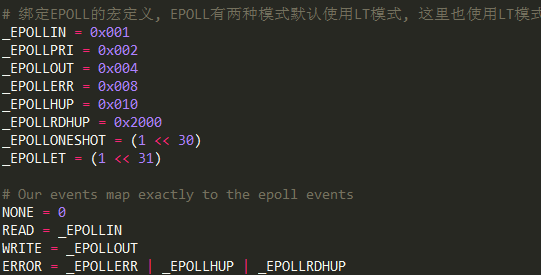这篇文章来写tornado的ioloop,由于看的源码是1.0 可能和现在的版本有一些出入
在读源码之前需要有一些socket、tcp/ip和http协议的概念。
ioloop是tornado的核心主要实现了事件与回调函数的循环
说到事件就不得不说epoll事件模型,当初读源码的时候这部分看了很长时间。
首先说说epoll:
epoll的定义: epoll是Linux内核为处理大批量句柄而作了改进的poll,是Linux下多路复用IO接口select/poll的增强版本,它能显著减少程序在大量并发连接中只有少量活跃的情况下的系统CPU利用率。现在十分火的nginx服务器就是用epoll作为事件模型。
对于tornado的学习有一个概念非常重要,就是事件的循环。类似于js的工作方式(个人理解), 一般会有一个主线程来作为事件循环,当有事件发生时,可能并不会马上做出相应的处理,而是在下一个循环中去做相应的处理。
下面是ioloop的几个主要函数
大概的意思根据名字就能看出来, 其中add_handler, update_handler, remove_handler文件描述符和对应的回调函数
最开始几行是静态变量,定义了一些常量,这里面epoll有两种模式LT和ET,其中tornado使用LT模式
主要的两个方法是__init__初始化和start函数

初始化函数:
# 开始事件循环, 这里面因为EPOLL需要绑定文件描述符, 使用管道来代替.
# 之所以新创建一个管道来绑定epoll事件, 是因为tornado有一个事件循环, 所以使用管道来触发epoll是可以快速响应的, 而不是等待0.2秒的循环
# epoll是当对文件描述符进行读写的时候才会触发对应的事件,
# 只对事件进行modify(epoll_ctl的绑定)时触发一次事件(待验证)
def __init__(self, impl=None):
self._impl = impl or _poll()
if hasattr(self._impl, 'fileno'):
self._set_close_exec(self._impl.fileno())
self._handlers = {}
self._events = {}
self._callbacks = set()
self._timeouts = []
self._running = False
self._stopped = False
self._blocking_log_threshold = None
# Create a pipe that we send bogus data to when we want to wake
# the I/O loop when it is idle
if os.name != 'nt':
r, w = os.pipe()
self._set_nonblocking(r)
self._set_nonblocking(w)
self._set_close_exec(r)
self._set_close_exec(w)
self._waker_reader = os.fdopen(r, "r", 0)
self._waker_writer = os.fdopen(w, "w", 0)
else:
self._waker_reader = self._waker_writer = win32_support.Pipe()
r = self._waker_writer.reader_fd
#注册self._read_waker方法, 文件描述为新建管道的读标志符, 事件为epoll_read
#当向新创建的管道写入字符时, 就可以触发epoll事件, 然后_read_waker将写入的字符读取出来
#目的是为了添加下一个循环的方法时快速触发epoll事件来执行下一个循环
self.add_handler(r, self._read_waker, self.READ)
start函数中主要的事件循环, 逻辑还是比较清晰的:
while True:
# Never use an infinite timeout here - it can stall epoll
poll_timeout = 0.2
# Prevent IO event starvation by delaying new callbacks
# to the next iteration of the event loop.
callbacks = list(self._callbacks)
for callback in callbacks:
# A callback can add or remove other callbacks
if callback in self._callbacks:
self._callbacks.remove(callback)
self._run_callback(callback)
if self._callbacks:
poll_timeout = 0.0
#timeout回调函数, 使用最小堆
if self._timeouts:
now = time.time()
while self._timeouts and self._timeouts[0].deadline <= now:
timeout = self._timeouts.pop(0)
self._run_callback(timeout.callback)
if self._timeouts:
milliseconds = self._timeouts[0].deadline - now
poll_timeout = min(milliseconds, poll_timeout)
if not self._running:
break
if self._blocking_log_threshold is not None:
# clear alarm so it doesn't fire while poll is waiting for
# events.
signal.setitimer(signal.ITIMER_REAL, 0, 0)
#获取epoll的触发事件, 如果有callback则不设置过期时间,
#如果没有callback则设置过期时间为0.2秒, 开始下一个循环
#poll函数返回文件描述符和对应的事件
try:
event_pairs = self._impl.poll(poll_timeout)
except Exception, e:
# Depending on python version and IOLoop implementation,
# different exception types may be thrown and there are
# two ways EINTR might be signaled:
# * e.errno == errno.EINTR
# * e.args is like (errno.EINTR, 'Interrupted system call')
if (getattr(e, 'errno') == errno.EINTR or
(isinstance(getattr(e, 'args'), tuple) and
len(e.args) == 2 and e.args[0] == errno.EINTR)):
logging.warning("Interrupted system call", exc_info=1)
continue
else:
raise
if self._blocking_log_threshold is not None:
signal.setitimer(signal.ITIMER_REAL,
self._blocking_log_threshold, 0)
# Pop one fd at a time from the set of pending fds and run
# its handler. Since that handler may perform actions on
# other file descriptors, there may be reentrant calls to
# this IOLoop that update self._events
self._events.update(event_pairs)
while self._events:
fd, events = self._events.popitem()
try:
self._handlers[fd](fd, events)
except (KeyboardInterrupt, SystemExit):
raise
except (OSError, IOError), e:
if e[0] == errno.EPIPE:
# Happens when the client closes the connection
pass
else:
logging.error("Exception in I/O handler for fd %d",
fd, exc_info=True)
except:
logging.error("Exception in I/O handler for fd %d",
fd, exc_info=True)
当poll之后调用之前注册的文件描述符的回调函数即可
这里我对signal这部分是做什么的不是很理解, 希望有知道的可以给我讲一下




 本文深入探讨了 Tornado 的 ioloop 模块,详细介绍了其核心功能及实现机制,特别是 epoll 事件模型的应用。通过分析 ioloop 的关键函数和工作流程,帮助读者理解事件循环的基本原理。
本文深入探讨了 Tornado 的 ioloop 模块,详细介绍了其核心功能及实现机制,特别是 epoll 事件模型的应用。通过分析 ioloop 的关键函数和工作流程,帮助读者理解事件循环的基本原理。
















 1310
1310

 被折叠的 条评论
为什么被折叠?
被折叠的 条评论
为什么被折叠?








